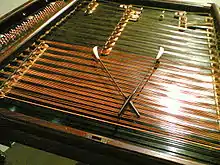cimbalom
English

A cimbalom
Pronunciation
- IPA(key): /ˈsɪmbələm/
Noun
cimbalom (plural cimbaloms)
- (music) A type of concert hammered dulcimer used primarily in the music of Eastern Europe.
- 2007 September 17, Bernard Holland, “Cryptic Messages or Silence From the ’60s Avant-Garde”, in New York Times:
- Either/Or, including Anthony Burr, clarinetist; Jane Rigler, flutist; and Richard Carrick and David Shively, percussionists, also employed the cimbalom, the Hungarian pianolike mutant whose twang remains familiar to boozy evenings in late-night Central European bars.
-
Hungarian

cimbalom
Etymology
Borrowed from Latin cymbalum (“cymbal”), from Ancient Greek κύμβαλον (kúmbalon). First attested after 1416.[1]
Pronunciation
- IPA(key): [ˈt͡simbɒlom]
- Hyphenation: cim‧ba‧lom
Declension
| Inflection (stem in -o-, back harmony) | ||
|---|---|---|
| singular | plural | |
| nominative | cimbalom | cimbalmok |
| accusative | cimbalmot | cimbalmokat |
| dative | cimbalomnak | cimbalmoknak |
| instrumental | cimbalommal | cimbalmokkal |
| causal-final | cimbalomért | cimbalmokért |
| translative | cimbalommá | cimbalmokká |
| terminative | cimbalomig | cimbalmokig |
| essive-formal | cimbalomként | cimbalmokként |
| essive-modal | — | — |
| inessive | cimbalomban | cimbalmokban |
| superessive | cimbalmon | cimbalmokon |
| adessive | cimbalomnál | cimbalmoknál |
| illative | cimbalomba | cimbalmokba |
| sublative | cimbalomra | cimbalmokra |
| allative | cimbalomhoz | cimbalmokhoz |
| elative | cimbalomból | cimbalmokból |
| delative | cimbalomról | cimbalmokról |
| ablative | cimbalomtól | cimbalmoktól |
| Possessive forms of cimbalom | ||
|---|---|---|
| possessor | single possession | multiple possessions |
| 1st person sing. | cimbalmom | cimbalmaim |
| 2nd person sing. | cimbalmod | cimbalmaid |
| 3rd person sing. | cimbalma | cimbalmai |
| 1st person plural | cimbalmunk | cimbalmaink |
| 2nd person plural | cimbalmotok | cimbalmaitok |
| 3rd person plural | cimbalmuk | cimbalmaik |
Derived terms
References
- Zaicz, Gábor. Etimológiai szótár: Magyar szavak és toldalékok eredete (’Dictionary of Etymology: The origin of Hungarian words and affixes’). Budapest: Tinta Könyvkiadó, 2006, →ISBN
This article is issued from Wiktionary. The text is licensed under Creative Commons - Attribution - Sharealike. Additional terms may apply for the media files.